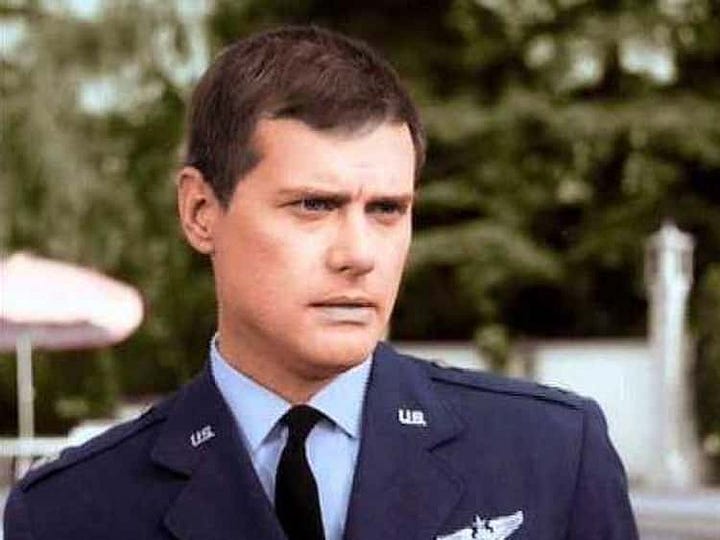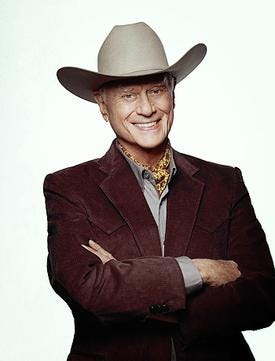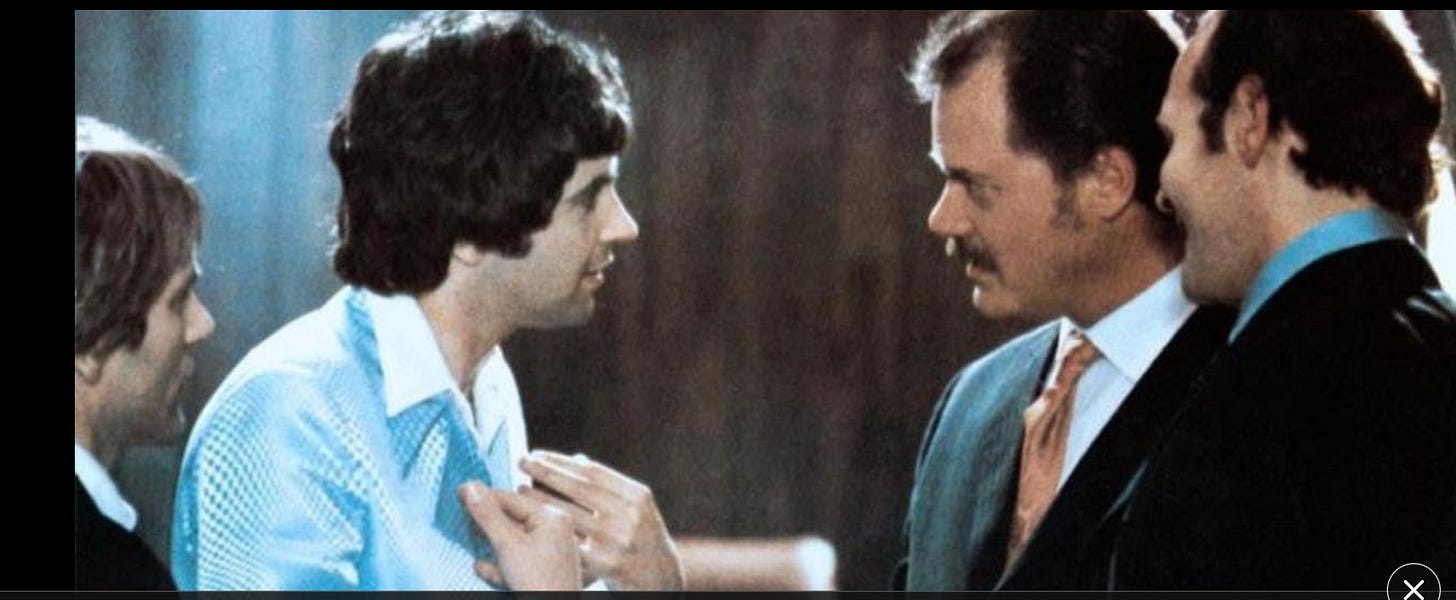From the Keith Moon archives: my Larry Hagman interview.
"Keith said, ‘I’m not doing nothing illegal - I’m just doing lots of it!’"
As someone who has spent a lifetime in the middle of the music and media worlds, I am not a big one for name-dropping. But facts are facts, and I certainly did get some satisfaction by association back in September 1997, on the occasion of our son’s second birthday party.
We were still quite new to the Brooklyn neighborhood of lower Park Slope at the time, and our street wore the scars from NYC’s heady crime waves earlier in the decade. But as I got on with researching my biography of Keith Moon, focused now on US-based interviewees, we had established a small piece of green peace in our small back yard. That day we were using it to host a few of the fellow toddlers our son had befriended in the local play parks and day cares, along with their generally lovely parents, many of whom became firm friends.
I was busy doing whatever dads do at such events when I heard the phone ring, and my wife pick it up. She came out to the garden a few second later to state the following:
“Tony, it’s Larry Hagman for you.”
What was she meant to do? Lie?


The two-year olds, of course, were resolutely unimpressed and got on with playing in the blow-up pool or smearing birthday cake on their faces or whatever it was they were doing. But their parents, some of whom had a vague idea of what I was up to at the big black desk I had just installed upstairs but none of whom truly knew me? Their faces were a treasure. Certainly, there were a few double-takes and quizzical eyebrows as I went up to my “office” - the room with the prison bars on the windows overlooking the street - to take the call.
That call was not a total surprise. Just like Oliver Reed, the British actor whose status in the UK was on a similar level to that of Larry Hagman in the US and beyond, I had sent to whatever agent or manager I had been able to track down (and almost certainly by good old fax) an explanation of the book I was writing and a request for an interview. And just like Oliver Reed, said gatekeeper came back remarkably quickly to let me know that Mr. Hagman had my number and would be giving me a call: as noted in my intro to my momentous Ollie Reed interview, the truly famous are perfectly capable and more than amenable to handling their own personal affairs. Clearly, a California Sunday morning seemed as good a time as any for Larry to make that call to the East Coast.
When I recount any aspect of this anecdote or the interview that followed, I am usually still met with a quizzical gaze. A lot of people associate Keith Moon with Oliver Reed from the Tommy movie, and know of the subsequent mayhem they caused around the globe as a pair of especially terrible twins. But Keith Moon and Larry Hagman? Has anyone even seen a picture of them together?

Well, not exactly, but they too appeared in a music film, one of the truly great music films in fact, a film that predated Tommy by a year and, in one of its finale scenes, rather foretold Ken Russell’s decision in Tommy to turn Roger Daltrey into a Messiah figure. The film was Stardust, the sequel to 1973’s That’ll Be The Day. Both movies starred – and duly made a star out of – a young David Essex as a Paul McCartney-like rocker turned Beatles-esque moptop pop idol, who in Stardust is convinced to quit his band The Stray Cats (yep, that’s where they got the name from), turn solo, and take up with a secondary manager, the aforementioned Larry Hagman as Porter Lee Austin, an assertive role of material and macho dominance that quite clearly led to that of JR himself (yep, that’s where they got the character from).
Written by Ray Connolly, directed by Michael Apted, and produced by David Puttnam, Stardust may have been absent Ringo Starr and Billy Fury, each of whom made appearances in That’ll Be The Day, but its list of musicians playing as actors playing as musicians and managers remains quite formidable, including Dave Edmunds, Paul Nicholas, Marty Wilde, and an uncredited Nick Lowe. Then there is Adam Faith as Essex’s original manager, a role he plays so convincingly that anytime someone in the music or media world asks me if I “Fancy a drink?” I instinctively fear I’m about to get fired for something. Also in the Stray Cats is Karl Howman, future co-star of Porridge and Minder, and on the drums, in the role of J.D. Clover… yes, you guessed it, a certain Keith Moon, whose fame at the time was such that he gets lead billing on the following British movie trailer.
That’ll Be The Day and Stardust were the films that established Keith’s acting bona fides. To the extent that Keith ever acted, rather than merely acted out, there is one scene in That’ll Be The Day that he positively steals. Stardust was a harder venture for him all around, and given that I interviewed Puttnam, Howman, Connolly and Edmunds, all in person, for the Moon biography (and Hagman by phone), much of and about those difficulties was included in Dear Boy/Moon.
But along the path of Stardust’s production, almost inevitably, Keith befriended Larry Hagman – The Who star was easily star-struck himself - and that friendship developed once Moon moved to Los Angeles. It also ran deep, or Larry wouldn’t have been calling me from his home phone on a Sunday. Hagman, who was 65 at the time and far beyond the need to handle a request like mine, was a true charm on the call, and would have gamely done the interview there and then. But he had sensed immediately that he had interrupted a gathering, and when I explained who it was for, he was insistent that I go back to my two-year old’s party and that we chat later in the week. And so we did.
The transcript follows for Wordsmith’s paid Substack subscribers, as per all the archive interviews I publish here on Substack. That treasure chest currently includes Moon-related interviews with Oliver Reed, John Entwistle, Alice Cooper, and Jeff Beck, with plenty more to follow. I also have posted my 1978 interview with Pete Townshend, my 1979 interview with Bill Nelson, and my 1989 interview with Keith Richards. Access to these, the rest of the archives, and the Crossed Channels podcast are available to all paid subscribers for just $5 a month or $40 a year. The special coffee at my local book shop costs more, and it’s gone in five minutes. So while I might not call a subscription to Wordsmith “the best I ever had,” still “I’d call that a bargain,” with apologies to Pete for taking lyrics out of context!
And by way of conclusion, yes, when I returned to our small back yard a few minutes later, our guests were eager for verification. The Larry Hagman just called you? I’m not one to name-drop. But occasionally, you can’t help yourself. Yes, that was indeed the Larry Hagman.


